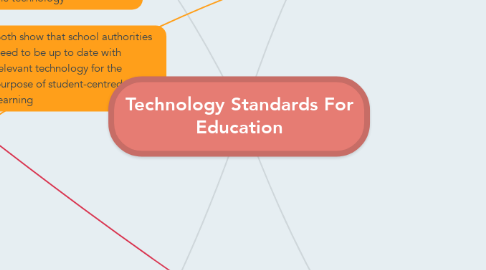Technology Standards For Education
by Kimberly Heacock

1. ISTE Standards For Teachers
1.1. Inspire Student Learning And Creativity - Using digital tools and other resources, Teachers engage students in investigating real-world issues and problem solving.
1.2. Design and Develop Digital Age Learning Experiences and Assessments - Develop a learning environment that allows all students access to technology in order to pursue their curiosities and develop their personal learning skills.
1.3. Model Digital Age Work and Learning - Use technology to collaborate with students, peers, and parents.
1.4. Promote and Model Digital Citizenship and Responsibility - Teachers teach students safety, responsibility and respect that needs to be demonstrated while using technology.
1.5. Engage in Professional Growth and Leadership - Teachers use technology to advance their teaching practice and promote its use in their academic community.
1.6. Engage in Professional Growth and Leadership - Use research to apply digital tools in the classroom, use them effectively, and support technology use in regards to student learning.
2. Learning And Technology Policy Framework
2.1. Student-Centred Learning - Students use technology to organize, think critically, know how to learn, innovate, communicate, and identify. They can demonstrate that they know how to use technology effectively.
2.2. Research and Innovation - Teachers must be up to date with technology. Use participated research in their teaching practice.
2.3. Professional Learning - Teachers must be current with technology and be able to apply it effectively in their lessons.
2.4. Leadership - The government, teachers, and administrators keep up to date with technology in order to support student-centred learning.
2.5. Access, Infrastructure, and Digital Learning Environments - Teachers and students support and have access to a variety of technological applications and devices. They support using appropriate technology safely in an academic setting.
2.6. School Authorities - Develop support for student-centred learning through technology. Using technology coherently across a curriculum. Create innovated culture in the use of technology to engage students in learning. Technology access for all.
3. ISTE Standards For Students
3.1. Global Collaborator - Students use digital tools to engage in learning about different backgrounds in a way that broadens their current understanding.
3.2. Innovative Designer - Students use design technology to identify and problem solve by creating new solutions.
3.3. Knowledge Constructor - Build knowledge by exploring real world issues, develop theories and ideas. As well as come up with answers and solutions.
3.4. Knowledge Constructor - Be able to apply research techniques to find information for personal intellect.
3.5. Digital Citizen- Demonstrate safe, responsible, and respectful behaviour while using technology (ex. online communication)
3.6. Global Collaborator - Use technology to work collaboratively with others.
4. ICT Program of Studies
4.1. Processes For Productivity - Students use technology to navigate, communicate, integrate, and organize. They can use technology such as hyperlinks, data, multimedia, text revisions, and applications.
4.2. Communicating, Inquiring, Decision Making, and Problem Solving - Students will more specifically learn what to use technology for. Be that seeking a variety or viewpoints or critically assessing informations.
4.3. Foundational Operations, Knowledge and Concepts - The students will understand how to operate technology, and how to use it safely and appropriately.
4.4. Foundational Operations, Knowledge and Concepts - The students will understand the role technology plays in the world and how to use it accordingly.
4.5. Communicating, Inquiring, Decision Making, and Problem Solving - Students will know how to use technology to collaborate and how to use it to improve personal knowledge.
4.6. The ICT curriculum is to be infused within core courses and programs.


